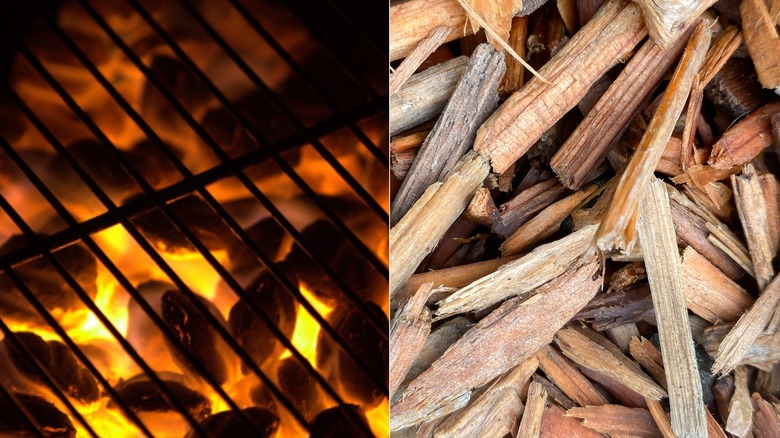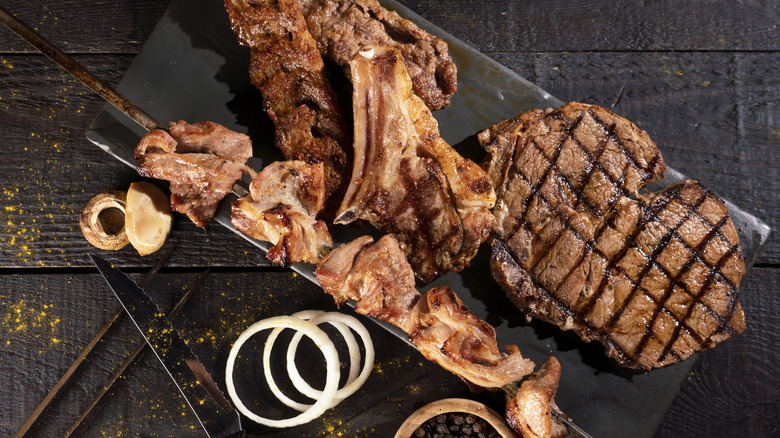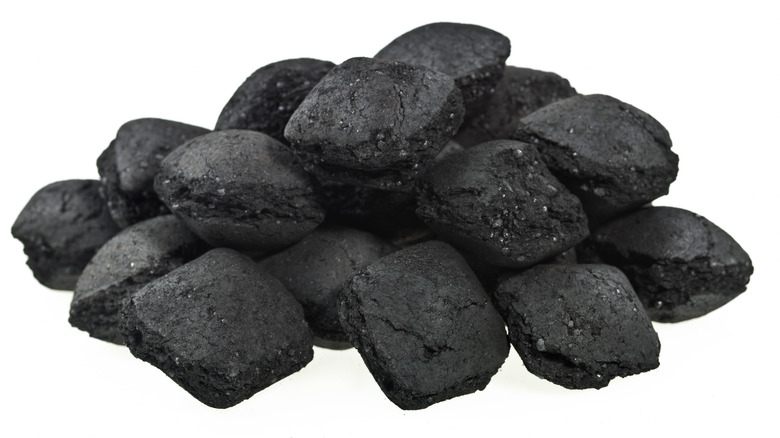Grilling With Wood Chips Vs Charcoal: The Tips You Need To Know
Nothing quite beats the flavor and the fun of grilling during the summer. But if it's been a while since you've fired up the old grill, or you're simply looking to take the art of outdoor cooking to another level, you might be asking yourself what to reach for at the grocery store: Wood chips or charcoal for grilling? The two options can pose a question of health and also flavor.
Why not consult an expert when it comes to deciding between the two? Take it from an experienced grill master: There are a few factors to ensure the best-tasting barbecue and avoid the potentially dangerous and not-so-healthy side of grilling. Silvio Correa is a Brazilian Grill Master and has years of experience working as a personal chef. In an exclusive interview, he told Daily Meal, "Although I have used charcoal all my life, after 24 years in Southern California, I have experimented with different types of wood for BBQ at home and with some chef friends who use wood." Research and personal experience have shaped this chef's perspective on grilling with wood chips and charcoal.
Grilling with charcoal and wood can produce different flavors
Grilling meats and vegetables naturally brings out some delectable notes and aromas, but the real complexity in the flavor profile typically comes from the smoke produced when the wood or charcoal burns. The smoke gathers beneath the hot griddle, and the food absorbs the smoke and flavor as it rises, often resulting in a grilled masterpiece.
According to Silvio Correa, "The kind of wood you use for barbecuing affects how your food tastes." The results can vary depending on what you're using to burn. Although charcoal can be easier to purchase at your grocery store and is simple to handle, it tends to produce a milder flavor than most wood. However, various types of wood, when burned, can infuse complex, mouthwatering flavors that pair nicely with specific types of meat and veggies. Correa says, "Woods like oak, hickory, and fruitwoods burn nicely for a long time and give off a gentle smoke that makes the natural flavors of the meat even better without being too strong."
Skip the additives when selecting your charcoal
Another defining factor when it comes to selecting charcoal or wood for your grill-time skills are the harmful ingredients often found in store-bought, mass-produced charcoal. Harmful additives and binders can lurk within common brands to help the briquettes keep their shape or to make them easy to light. These options are well marketed, but they essentially contain lighter fluid, which is highly toxic when ingested and can cause a string of devastating health problems, such as severe burning, respiratory difficulties, and coma, according to DoveMed. So, not only can these ingredients affect the flavor of your food, but consuming any amount of these chemicals can be harmful to you and your family.
Mastering charcoal can be challenging, but with a few tips, you'll be grilling like a master. Silvio Correa says, "I grew up using charcoal for my barbecues, and today my favorite is oak and hickory hardwood lump charcoal, which is 100% natural without chemical additives." This particular product is great for various types of grills and smokers. "It is easy to light, burns hot and long with low ash," says Correa. A little research goes a long way, and there are plenty of great options for organic or non-toxic charcoal on the market today.


